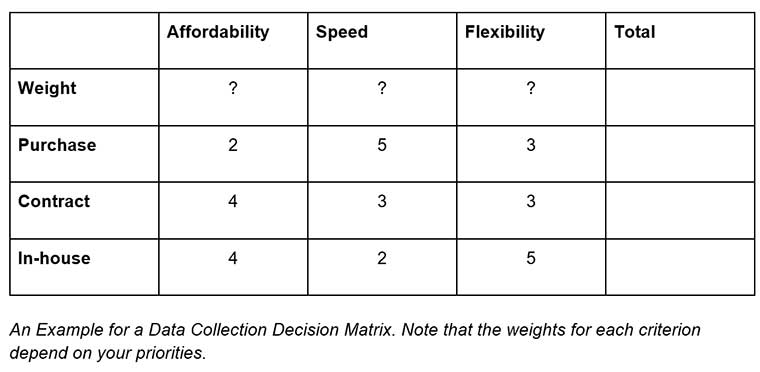Making the Executive Decision On Data Gathering For Your Business

Data is a very powerful resource for modern businesses. Better data lets any business benefit from a more granular understanding of their audience and target markets. However, even though every digital company strives to be “data-driven”, they take different approaches to getting the data. Most of the time, it’s the CEO who has to decide how the company will collect the data it needs. This article is focused on that crucial decision when it comes to collecting publicly available data.
In most cases, businesses should also collect data from their own platforms or websites by using a variety of tools and methods. Nevertheless, the real value comes from knowing the market and competitors better. Today, there are businesses that exist purely to gather data to sell to others, as anyone can purchase bulk data sets from these companies and potentially make a significant ROI. Similar to these businesses are smaller teams of contractors who can set up custom data gathering (or web scraping) solutions to fetch specific types of data for you from online sources. Some of these contractors provide access to regularly-scraped data on a subscription basis.
To find out which of these options is best for your business, you have to consider a number of factors, such as your budget, the timeframe in which you want to start getting the data, and how flexible you want to be in the long run.
Purchasing Data
Buying data is pretty self-explanatory – someone has (or is able to quickly gather) a large base of data that businesses want so they make it available for the right price. There are a plethora of data brokers and suppliers operating today. Before going with a data broker, you should find out whether they specialize in your industry, as most of these data providers will be generalists and might lack some specific information about what is important in your market.
Depending on the industry in question, these suppliers might be scraping publically-available data, as is the case for businesses like location data provider Factual. Alternatively, data suppliers might be quite literally in the field gathering data themselves. Businesses who provide natural resources data to the mining industry, for example, often need to undertake physical surveys and record the data. Naturally, this kind of data can get very expensive.
Data brokers act as middlemen, sometimes providing online platforms for businesses to use to buy and sell data to one another. Some data brokers don’t gather any data themselves, they only supply what other people sell through them.
Usually, when you purchase a data set, what you are actually purchasing is access to that data. This means that a competing business can come along after you and access the same data themselves. Purchasing a dataset exclusively is possible, but given how much more it would cost it is usually more economical to spend that money hiring someone to gather the data themselves.
A pivotal factor to not purchase the data you need is the realization that the same data can and will be offered to your competitors. This means that any data point you order will give you the least market advantage in the long run. That is why buying data is only good as a short-term solution.
Hiring Contractors
Data as a service (DaaS) providers are businesses that will go and gather data for you. In most cases, this is done by customizing the service provider’s scraping solution for a single target data source. These services also tend to come with minimum-term contracts, locking you in for around a year on average. Throughout the duration of the contract, you will be able to access regularly-updated data gathered by the service provider.
The main benefits of hiring a DaaS provider are the skills and resources that you will gain access to. On the other hand, these providers will lack any industry-specific knowledge. That means that they won’t have the same intuition as you when it comes to identifying valuable data. You will need a lot of work to direct contractors and help them to identify useful data while minimizing junk data. On the plus side, the data you gather will not be offered to competing companies if you sign a proper contract with the contractor.
In-House Solutions
Depending on the industry you operate in and the kind of data you want, gathering your own data can either be the best long-term solution. Assuming that most of the data you want can be gathered from public sources, you will only need one or two software engineers to build the web scraping solution to automate data gathering. You can also attach a data analytics platform in order to automate analytics that you want to perform on all data sets.
Small businesses, especially those who already have someone on staff who is able to handle the software development, may find this method to be the most cost-effective solution for the long-term. On the other hand, it takes the most time to initially gather the first data set.
When companies choose to have in-house web scraping operations, they get more flexibility, as in-house specialists are the fastest to respond to any changes. This is the best option for those that want public data for the long-term and are not afraid of steeper initial costs for added flexibility and data accessibility.
Making the Decision for Your Business
When it comes to data procurement, there is no one-size-fits-all approach. The best option for you will depend on the nature of your business and the data that you’re after, as well as your long-term plans regarding data usage. There are three key criteria you can use to make your decision, depending on what your priority is – affordability, speed, and flexibility.
Affordability is more complex than it first appears. If you are purchasing a data set or access to a data set on a one-off basis, you will only need to pay a single lump sum. On the other hand, if you’re going for the DaaS option, you will have to factor in the recurring charges for the duration of your contract. Building your own DIY data gathering solution will incur some significant costs in the short-term, but will be more cost-effective in the long term.
If speed is a crucial factor for you, buying the data from a supplier or broker is the fastest option. Hiring DaaS contractors is a bit of a wildcard, they will have other projects and commitments and might need some guidance from you before they can produce useful results. Building your own DIY solution is likely to take quite some time as well.
In terms of flexibility, building your own platform is going to give you the most room to maneuver and will put you in complete control. Once the initial framework is built, it’s relatively simple to refine your scrapers or repurpose them entirely. You will always have the option of changing the way that you gather data, as well as what data you are prioritizing. You can make requests of contractors, but whether they are able to fulfill them is difficult to predict. If you are buying data then you are at the mercy of the market, you can only buy what’s for sale. In-house solutions also help you keep the data points you collect secret and not as easily accessible to competitors.
The best option for your business comes down to whether you need access to data as soon as possible and begin putting it to use immediately or whether you have time to forge a more efficient long-term solution. If you need the data quickly, purchasing it is your best option. If you are looking for a long-term arrangement and the flexibility to use the same solution to gather different data, you should start planning to build an in-house system.
Have you read?
# Best CEOs In The World 2019: Most Influential Chief Executives.
# World’s Best Countries To Invest In Or Do Business For 2019.
# Countries With The Best Quality of Life, 2019.
# Most Startup Friendly Countries In The World.
Bring the best of the CEOWORLD magazine's global journalism to audiences in the United States and around the world. - Add CEOWORLD magazine to your Google News feed.
Follow CEOWORLD magazine headlines on: Google News, LinkedIn, Twitter, and Facebook.
Copyright 2025 The CEOWORLD magazine. All rights reserved. This material (and any extract from it) must not be copied, redistributed or placed on any website, without CEOWORLD magazine' prior written consent. For media queries, please contact: info@ceoworld.biz









